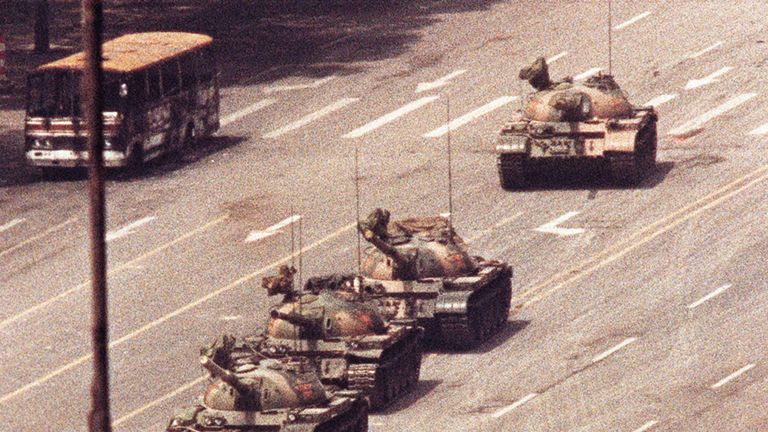Beijing in charge despite protestations of Hong Kong's autonomy
Carrie Lam told China that meeting two of the protesters' demands would calm the situation but it rejected the plan, say reports.
Friday 30 August 2019 11:42, UK
Throughout this summer of protest, Hong Kong's government has seemed paralysed.
As the city spiralled further out of control, Carrie Lam, Hong Kong's chief executive, refused to move an inch on the protesters' five demands.
That stubbornness only frustrated people further, fuelling more protests. And so on.
Now we perhaps have an explanation: The government wasn't paralysed. It was being held still, squeezed in Beijing's embrace.
Reuters reports that Ms Lam told Beijing that meeting two of the protesters' demands - to formally withdraw the extradition bill that started the unrest, and open an independent inquiry into the protests and the conduct of the police - would help calm the situation.
Beijing rejected the proposal.
It's an important and revealing story. Of all the protester demands, those two were the most modest.
Ms Lam had already suspended the extradition bill and pronounced it "dead". So it always seemed baffling that she did not go slightly further and formally withdraw it.
The same goes for an independent inquiry, something that could be promised right now, then delivered a long time later.
The other three demands - an amnesty for arrested protesters, a request that the protests should not be called "riots" (a charge which carries harsher sentences) and greater democracy for Hong Kong were non-starters.
But meeting the two demands would have addressed many Hong Kongers' real concerns.
More importantly, it would have shown the government was listening. The feeling they were being ignored is what drove many people to keep turning out, week after week.
In fact, Beijing was the one ignoring them. And so the protests have continued.
There are two important points here. One, it shows that Beijing really is in charge here, despite protestations of Hong Kong's autonomy. The Reuters story proves the protesters' point elegantly.
Second, it shows that Beijing has little real regard for the 'one country, two systems' model - and perhaps even less understanding of it.
Protest is a legitimate and legal means of political expression in Hong Kong. The city doesn't have fully free elections. So protest is one of the methods by which people can put their grievances to the government.
The Hong Kong government understood that and wanted to respond.
But the Chinese Communist Party (CCP) leadership exists in a very different system, where protest is illegitimate. Where it is not a means of voicing concern, but an existential challenge to the Party's authority.
The CCP has had no experience of dealing with sustained protest since Tiananmen Square in 1989.
Thanks to the Party's fearsome surveillance apparatus and its arbitrary detention of activists, protests are shut down before they even begin.
:: Listen to the Daily podcast on , , ,
There are further signs Beijing is trying to apply its boilerplate Stalinist approach to Hong Kong. The arrest of pro-democracy activists before this weekend's planned protests is evidence.
Those tactics work in an authoritarian regime. They don't work in Hong Kong and they have only contributed to greater unrest.
That the CCP doesn't fully understand the nature of the problem is troubling for what happens next. If there cannot be a political solution, because Beijing denies it, the final outcome can only be confrontation.









